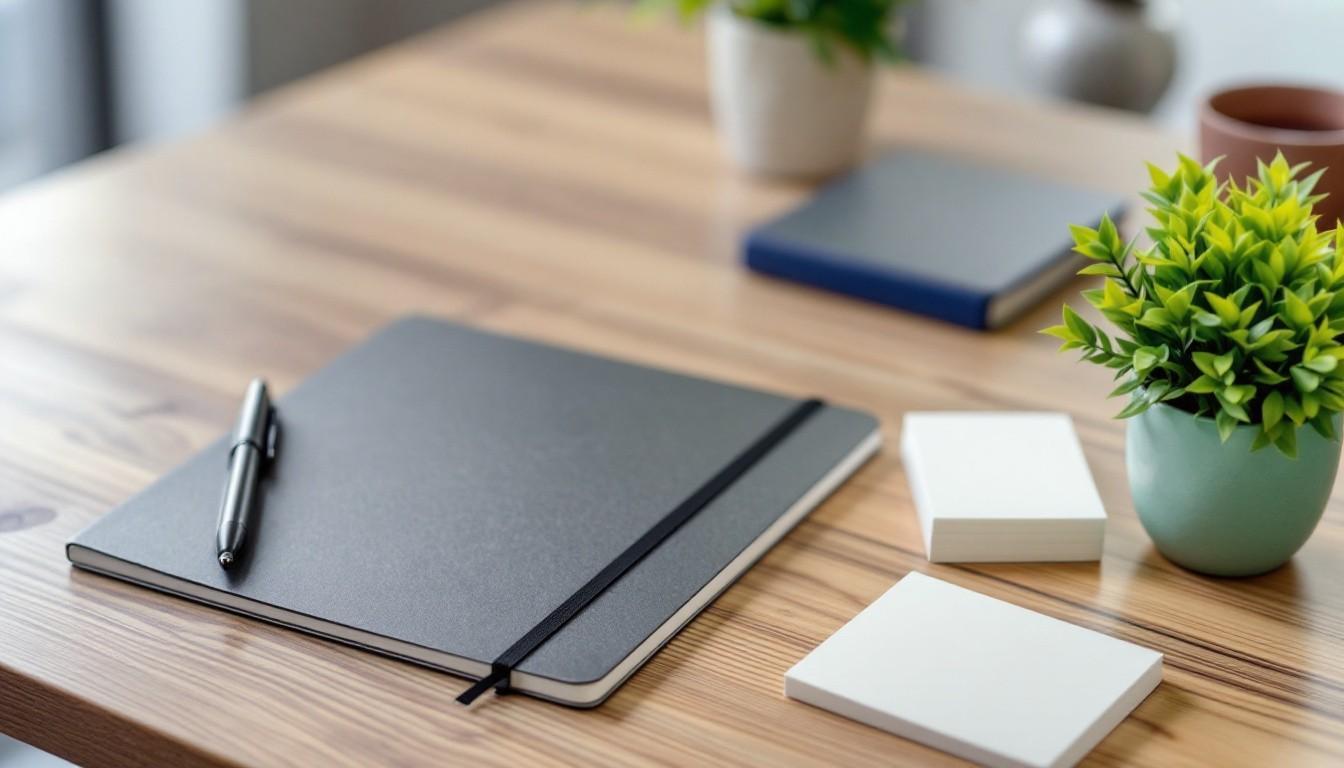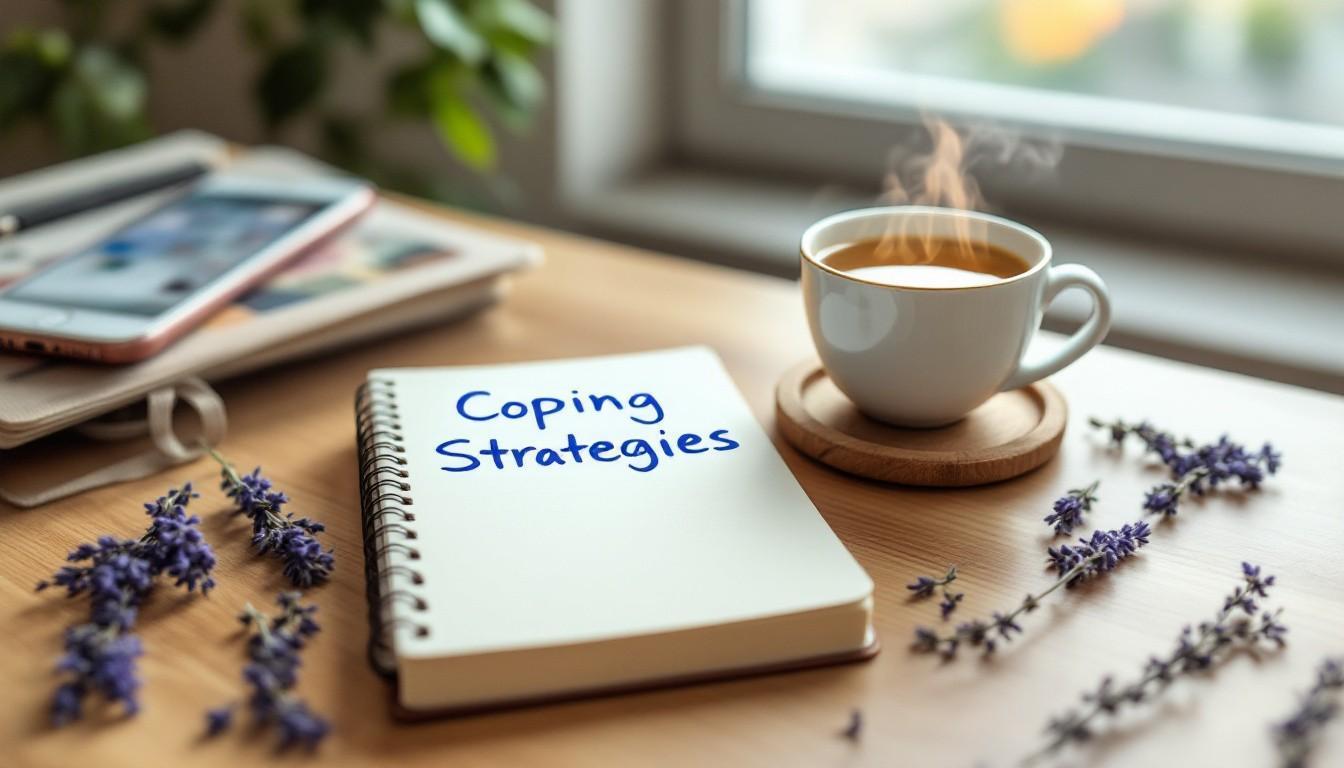Social anxiety can feel like an invisible barrier, keeping you from fully enjoying life’s moments. At Devine Interventions, we understand the challenges this condition presents.
We’ve crafted this guide to help you navigate social anxiety in a way that fits your unique lifestyle. Our aim is to provide practical strategies that you can easily incorporate into your daily routine.
What Is Social Anxiety?
Understanding the Core of Social Anxiety
Social anxiety goes beyond mere shyness or nervousness in social situations. It manifests as an intense fear of judgment, criticism, or embarrassment by others. This fear can become so overwhelming that it disrupts daily life, making it challenging to form relationships, perform at work, or complete simple tasks like grocery shopping.
Recognizing the Physical and Emotional Signs
Physical symptoms of social anxiety often include:
- Rapid heartbeat
- Excessive sweating
- Trembling
- Nausea
These physical reactions typically accompany intense feelings of self-consciousness and a strong desire to avoid social situations altogether. Many individuals with social anxiety report feeling as if they’re constantly under scrutiny, with every action or word being analyzed by those around them.
Common Triggers and Situations
Social anxiety can be triggered by various situations. Some people experience anxiety only in specific scenarios, while others find nearly any social interaction distressing. Common triggers include:
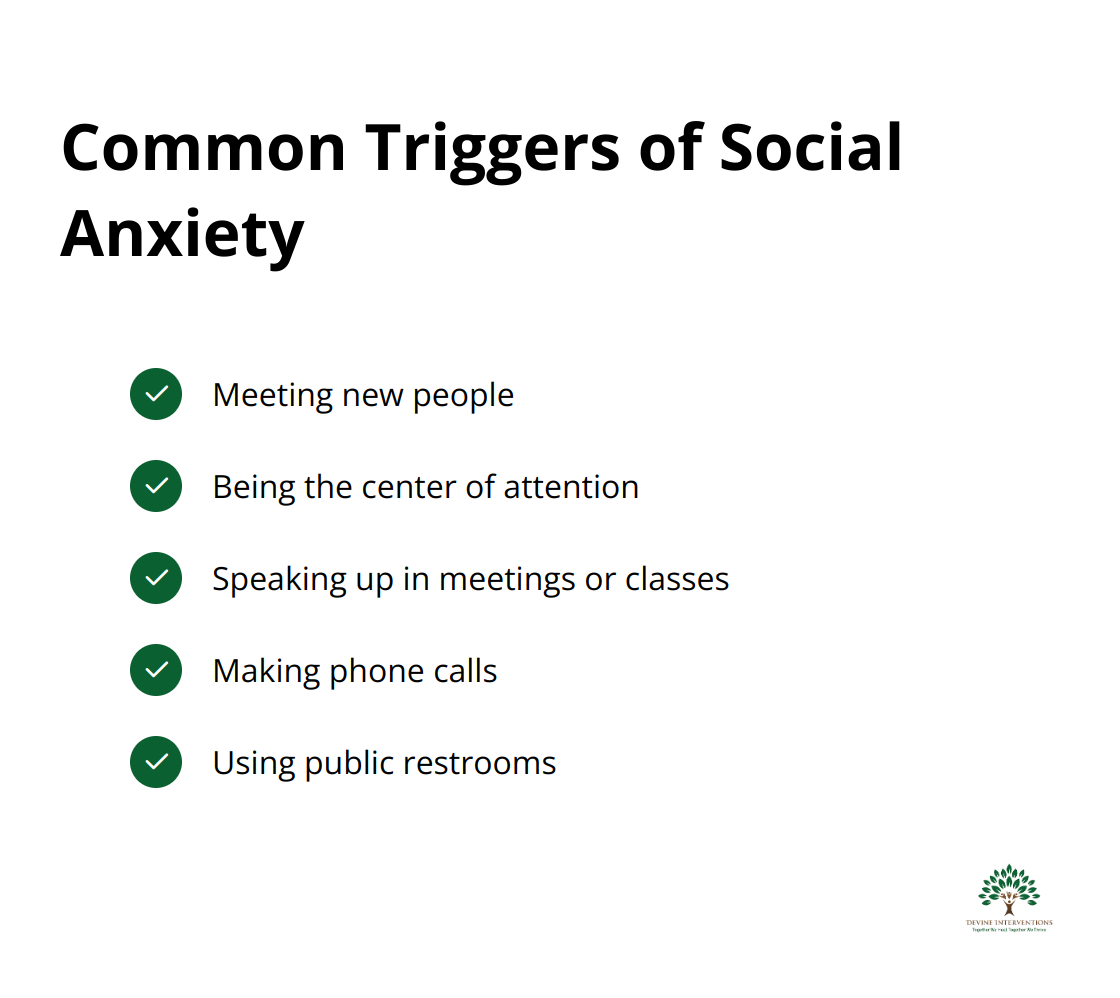
The Ripple Effect on Daily Life and Relationships
The impact of social anxiety extends far beyond discomfort in social situations. It can significantly affect personal relationships, career prospects, and overall quality of life. Many individuals with social anxiety turn down job opportunities, avoid social events, or struggle to maintain friendships. This isolation often leads to feelings of loneliness and depression, creating a difficult cycle to break.
At Devine Interventions, we’ve witnessed firsthand how social anxiety can hold people back from living their best lives. However, we’ve also seen incredible transformations when individuals take steps to manage their anxiety. With the right support and strategies, it’s possible to build confidence, improve social skills, and create meaningful connections with others.
If you identify with this description of social anxiety, know that you’re not alone. Many people struggle with these feelings, and effective management strategies exist. In the next section, we’ll explore practical techniques for dealing with social anxiety that you can start implementing today. These strategies will help you take control of your anxiety and move towards a more fulfilling social life.
How to Manage Social Anxiety Today
Challenge Your Thoughts
Social anxiety doesn’t have to control your life. One of the most effective ways to tackle social anxiety is to question your negative thoughts. When you feel anxious about a social situation, ask yourself: “Is this thought realistic?” Often, our anxious minds exaggerate the risks of social interactions.
Try this exercise: Write down your anxious thoughts before a social event. After the event, compare what actually happened to what you feared would happen. You’ll likely find that reality was far less scary than your imagination.
Cognitive Behavioral Therapy (CBT) exercises can help you identify and reframe unhelpful thoughts. Tailoring these interventions to your individual needs can boost the effectiveness of therapy.
Practice Mindful Breathing
When anxiety strikes, your breath is a powerful tool at your disposal. The 4-7-8 breathing technique can help calm your nervous system in moments of stress. Here’s how to do it:
- Inhale quietly through your nose for 4 seconds.
- Hold your breath for 7 seconds.
- Exhale completely through your mouth for 8 seconds.
- Repeat this cycle four times.
This technique, developed by Dr. Andrew Weil, reduces anxiety and promotes relaxation. Dr. Weil suggests that practicing this technique for 4 to 6 weeks can lower heart rate, improve blood pressure, digestion, and circulation, and can promote sleep. It’s a discreet method you can use anywhere, anytime.
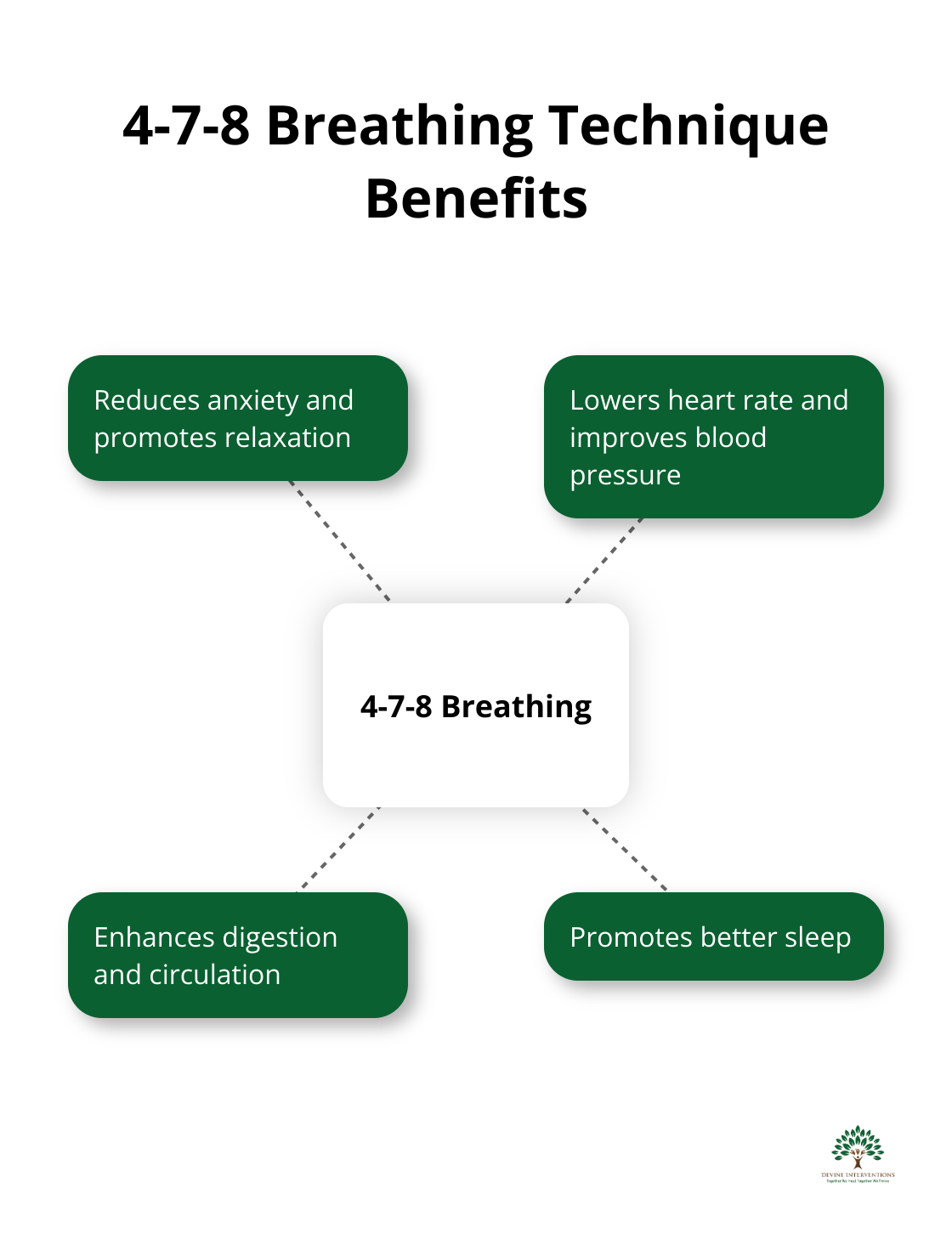
Start Small and Build Up
Overcoming social anxiety isn’t about diving into the deep end. It’s about taking small, manageable steps. Start with low-pressure social situations and gradually work your way up. For example:
- Week 1: Make eye contact and smile at a stranger.
- Week 2: Ask a store clerk for help finding an item.
- Week 3: Strike up a brief conversation with a coworker.
- Week 4: Attend a small gathering with friends.
Each successful interaction builds your confidence and proves that you can handle social situations. Keep a journal to track your progress and celebrate your victories (no matter how small they might seem).
Seek Professional Support
While self-help strategies are valuable, professional support can significantly accelerate your progress. Mental health experts (like those at Devine Interventions) can provide personalized strategies tailored to your specific needs and challenges. They can help you uncover underlying issues, develop coping mechanisms, and provide a safe space to practice social skills.
Practice Self-Compassion
Be kind to yourself as you navigate this journey. Social anxiety is a common struggle (affecting millions worldwide), and recovery takes time. Treat yourself with the same compassion you’d offer a friend facing similar challenges. Celebrate your efforts, not just your outcomes.
As you implement these strategies, you might find yourself ready for more advanced techniques or wondering how to build a stronger support system. Let’s explore how to create a network that nurtures your growth and confidence in social situations.
How to Build a Strong Support Network
Open Up to Trusted Friends and Family
Identify one or two people you trust. These could be close friends, family members, or a coworker. Share your experiences with social anxiety, explaining how it affects you. Be specific about situations that trigger your anxiety and how they make you feel.
For example, you might say: “I often feel overwhelmed at large gatherings. My heart races, and I worry about saying the wrong thing. Sometimes, I avoid these events altogether.”
Ask for their support in specific ways. This could include:
- Accompanying you to social events
- Checking in with you during gatherings
- Practicing social interactions together
Focus on those who offer empathy and support (even if some people don’t understand at first).
Explore Support Groups
Support groups provide a unique opportunity to connect with others who share similar experiences. The National Alliance on Mental Illness offers free peer-led support groups across the United States, both virtually and in person. These groups can provide valuable insights, coping strategies, and a sense of community.
Online forums and communities can also help. Websites like Anxiety and Depression Association of America host online support groups. These platforms allow you to share experiences and seek advice anonymously if you prefer.
When you join a support group, set small goals for participation. Start by listening and gradually work up to sharing your own experiences. This gradual approach can help manage anxiety about group participation.
Work with Mental Health Professionals
Working with a mental health professional is a key step in managing social anxiety. At Devine Interventions, our team of experts specializes in tailoring treatment plans to individual needs.
When you seek professional help:
- Be honest about your symptoms and their impact on your life
- Share your goals for treatment
- Ask about different therapy options, such as Cognitive Behavioral Therapy or Exposure Therapy
- Discuss the potential role of medication in your treatment plan
A mental health professional can also help you develop strategies for building and maintaining your support network. They can provide guidance on communicating your needs effectively and setting boundaries in relationships.
Leverage Online Resources
The internet offers a wealth of resources for managing social anxiety. Try to find reputable websites, blogs, and podcasts that provide information and coping strategies. Many mental health organizations (including Devine Interventions) offer online resources, webinars, and self-help tools.
Online therapy platforms can also provide access to professional support from the comfort of your home. This option can be particularly helpful if you find in-person interactions challenging.
Create a Self-Care Routine
Building a strong support network includes supporting yourself. Establish a self-care routine that nurtures your mental and physical health. This might include:
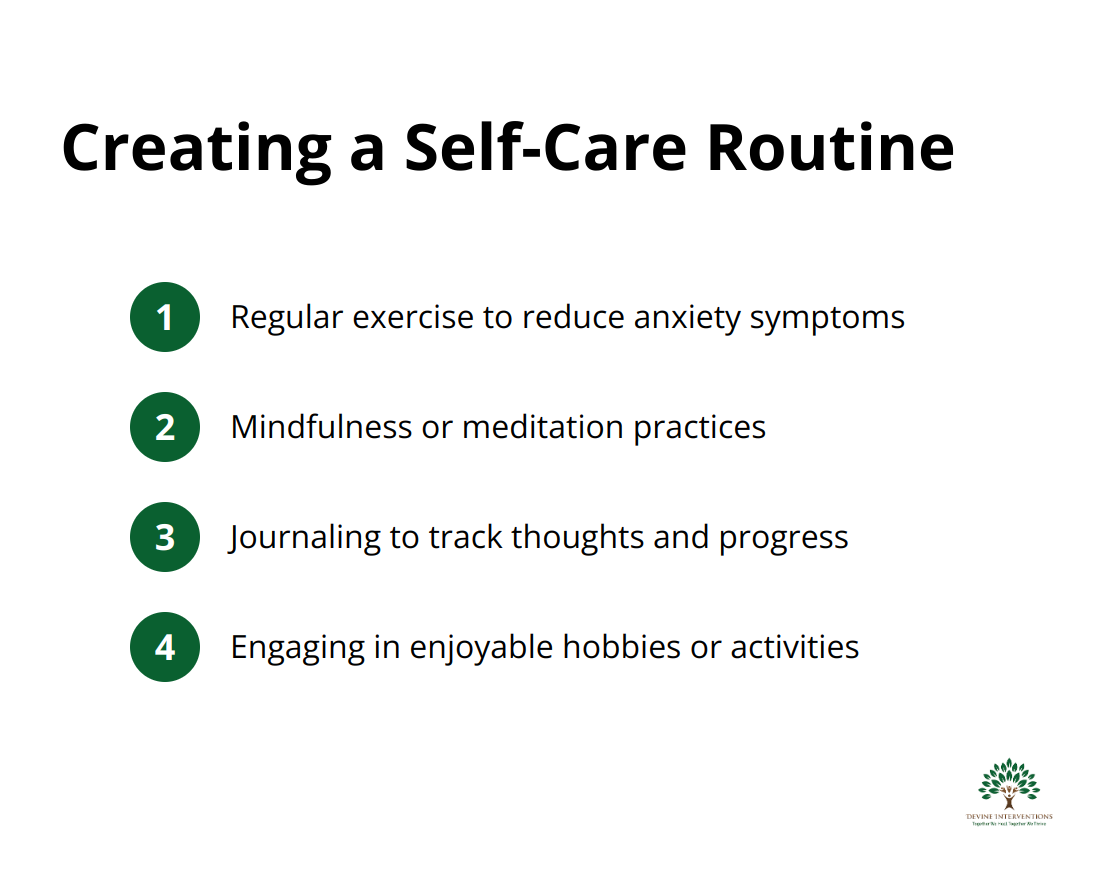
Try to incorporate these activities into your daily or weekly routine. Consistent self-care can boost your resilience and make it easier to engage with your support network.
Final Thoughts
Social anxiety management requires patience and personalized strategies. We explored techniques to help you navigate social situations with more confidence. These tools can significantly impact your daily life and lead to personal growth.
Building a strong support network provides invaluable guidance and encouragement. Connections with trusted individuals offer safe spaces to practice social skills and gain new perspectives on anxiety management. Professional support can accelerate your progress in overcoming social anxiety.
At Devine Interventions, we offer care tailored to your unique needs. Our team specializes in evidence-based treatments and provides personalized plans to address social anxiety (and other mental health concerns). If social anxiety impacts your life, reach out for professional support today.



